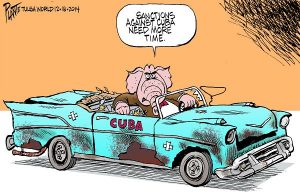
Since February, 1962, the United States has maintained a trade embargo against Cuba, one of our closest neighbors. The embargo effectively prevents normal business between the two countries; in addition, free travel is prohibited, and U.S. banks are effectively prevented from doing any business with Cuba or with individuals in Cuba.
President Kennedy signed the embargo to reduce “the threat posed by its alignment with the communist powers.” At the time, Fidel Castro had recently come to power, we were at the height of the cold war with the Soviet Union, and the soviets were building a military presence in Cuba. The main reasons for the embargo no longer exist, and it failed to achieve any of its objectives. Yet bipartisan efforts to lift the embargo in Congress have failed; in fact, they do not even make it to the floor for debate.
For a detailed summary of the issues with the embargo, its pros and cons, see https://cuba-embargo.procon.org/ .
The embargo costs both countries money (that is, both countries would benefit financially if it were lifted), and punishes the people of both the U.S. and Cuba. Proponents of continuing the embargo point out that, even though no one named Castro is any longer in power, the embargo is still aimed at obtaining freedom for the Cuban people (such as political and financial freedom, press, and free speech). In other words, we are punishing both U.S. and Cuban business and restricting freedom for U.S. and Cuban citizens for the benefit of the Cuban people.
This rationale doesn’t make any sense. The Cuban people do not support the embargo, and there is no evidence that keeping it for another year, or another 55, will gain them any freedom. At the same time, it continues to restrict freedom and unquestionably to hurt the Cuban people. The embargo continues simply because of the strong political influence of a few passionate and powerful Americans of Cuban heritage whose main ties to Cuba are from a regime that was overthrown in the 1950s.
Travel to Cuba is “prohibited”, with a few exceptions that can be easily taken advantage of. I traveled to Cuba in 2017, not long after legislation to overturn the embargo was introduced (and died). Travel to Cuba is not normal; numerous restrictions are in place, mostly placed on us by our own government. Europeans can travel freely to most parts of Cuba, and can use credit cards to pay for purchases. American citizens cannot.
The Cuban people are vibrant, resourceful, and diverse, with a rich culture and history. They are very poor — not nearly as poor as African nations like Uganda or Ethiopia or even other Caribbean nations but much poorer than the wealthiest countries in Latin America, such as Mexico, Chile, Argentina or Colombia. Health care, education and basic services are conspicuously good for such a poor country and income inequality is relatively low.
There is no question that the overwhelming majority of Cubans are glad to see us and glad to do business with us, and would be grateful to have more trade, travel and tourism and would benefit from it. The government, while still controlling, has been gradually reforming and free enterprise is increasing, so individuals and individual businesses would certainly benefit from free trade and travel. It does not seem a good bet that we will help them more by continuing the embargo, which is estimated to cost the U.S. billions of dollars in trade dollars each year (a great deal of it in important agricultural exports) at a time when we are trying hard to improve our trade relations with other nations.
The continuing embargo is a great example of where politics prevails over policy and common sense.
